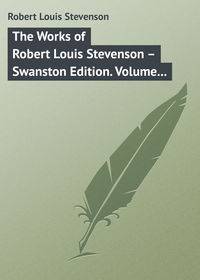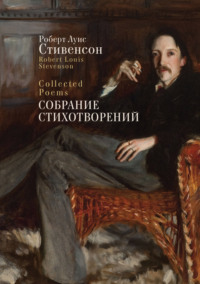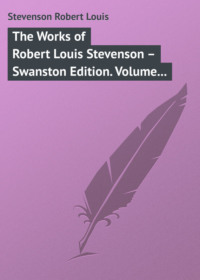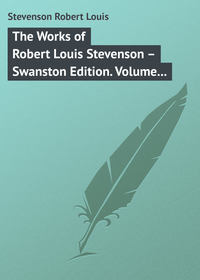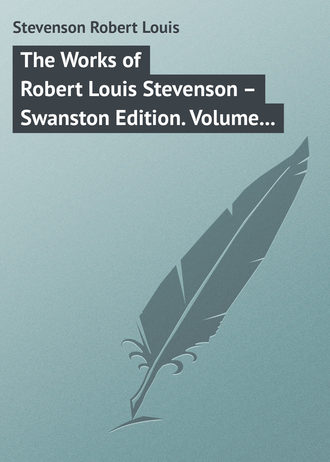 полная версия
полная версияThe Works of Robert Louis Stevenson – Swanston Edition. Volume 10
He rose on aching legs, and stumbled here and there among the rubbish-heaps, still circumvented by the yawning crater of the quarry; or perhaps he only thought so, for the darkness was already dense, the snow was growing thicker, and he moved like a blind man, and with a blind man’s terrors. At last he climbed a fence, thinking to drop into the road, and found himself staggering, instead, among the iron furrows of a ploughland, endless, it seemed, as a whole county. And next he was in a wood, beating among young trees; and then he was aware of a house with many lighted windows, Christmas carriages waiting at the doors, and Christmas drivers (for Christmas has a double edge) becoming swiftly hooded with snow. From this glimpse of human cheerfulness he fled like Cain; wandered in the night, unpiloted, careless of whither he went; fell and lay, and then rose again and wandered farther; and at last, like a transformation scene, behold him in the lighted jaws of the city, staring at a lamp which had already donned the tilted night-cap of the snow. It came thickly now, a “Feeding Storm”; and while he yet stood blinking at the lamp, his feet were buried. He remembered something like it in the past, a street lamp crowned and caked upon the windward side with snow, the wind uttering its mournful hoot, himself looking on, even as now; but the cold had struck too sharply on his wits, and memory failed him as to the date and sequel of the reminiscence.
His next conscious moment was on the Dean Bridge; but whether he was John Nicholson of a bank in California Street, or some former John, a clerk in his father’s office, he had now clean forgotten. Another blank, and he was thrusting his pass-key into the door-lock of his father’s house.
Hours must have passed. Whether crouched on the cold stones or wandering in the fields among the snow, was more than he could tell; but hours had passed. The finger of the hall clock was close on twelve; a narrow peep of gas in the hall-lamp shed shadows; and the door of the back room – his father’s room – was open and emitted a warm light. At so late an hour all this was strange; the lights should have been out, the doors locked, the good folk safe in bed. He marvelled at the irregularity, leaning on the hall table; and marvelled to himself there; and thawed and grew once more hungry in the warmer air of the house.
The clock uttered its premonitory catch; in five minutes Christmas Day would be among the days of the past – Christmas! – what a Christmas! Well, there was no use waiting; he had come into that house, he scarce knew how; if they were to thrust him forth again, it had best be done at once; and he moved to the door of the back room and entered.
O, well – then he was insane, as he had long believed.
There, in his father’s room, at midnight, the fire was roaring, and the gas blazing; the papers, the sacred papers – to lay a hand on which was criminal – had all been taken off and piled along the floor; a cloth was spread, and a supper laid, upon the business table; and in his father’s chair a woman, habited like a nun, sat eating. As he appeared in the doorway, the nun rose, gave a low cry, and stood staring. She was a large woman, strong, calm, a little masculine, her features marked with courage and good sense; and as John blinked back at her, a faint resemblance dodged about his memory, as when a tune haunts us, and yet will not be recalled.
“Why, it’s John!” cried the nun.
“I daresay I’m mad,” said John, unconsciously following King Lear; “but, upon my word, I do believe you’re Flora.”
“Of course I am,” replied she.
And yet it is not Flora at all, thought John; Flora was slender, and timid, and of changing colour, and dewy-eyed; and had Flora such an Edinburgh accent? But he said none of these things, which was perhaps as well. What he said was, “Then why are you a nun?”
“Such nonsense!” said Flora. “I’m a sick-nurse; and I am here nursing your sister, with whom, between you and me, there is precious little the matter. But that is not the question. The point is: How do you come here? and are you not ashamed to show yourself?”
“Flora,” said John sepulchrally, “I haven’t eaten anything for three days. Or, at least, I don’t know what day it is; but I guess I’m starving.”
“You unhappy man!” she cried. “Here, sit down and eat my supper; and I’ll just run upstairs and see my patient; not but what I doubt she’s fast asleep, for Maria is a malade imadginaire.”
With this specimen of the French, not of Stratford-atte-Bowe, but of a finishing establishment in Moray Place, she left John alone in his father’s sanctum. He fell at once upon the food; and it is to be supposed that Flora had found her patient wakeful, and been detained with some details of nursing, for he had time to make a full end of all there was to eat, and not only to empty the teapot, but to fill it again from a kettle that was fitfully singing on his father’s fire. Then he sat torpid, and pleased, and bewildered; his misfortunes were then half forgotten; his mind considering, not without regret, this unsentimental return to his old love.
He was thus engaged when that bustling woman noiselessly re-entered.
“Have you eaten?” said she. “Then tell me all about it.”
It was a long and (as the reader knows) a pitiful story; but Flora heard it with compressed lips. She was lost in none of those questionings of human destiny that have, from time to time, arrested the flight of my own pen; for women, such as she, are no philosophers, and behold the concrete only. And women, such as she, are very hard on the imperfect man.
“Very well,” said she, when he had done; “then down upon your knees at once, and beg God’s forgiveness.”
And the great baby plumped upon his knees, and did as he was bid; and none the worse for that! But while he was heartily enough requesting forgiveness on general principles, the rational side of him distinguished, and wondered if, perhaps, the apology were not due upon the other part. And when he rose again from that becoming exercise, he first eyed the face of his old love doubtfully, and then, taking heart, uttered his protest.
“I must say, Flora,” said he, “in all this business I can see very little fault of mine.”
“If you had written home,” replied the lady, “there would have been none of it. If you had even gone to Murrayfield reasonably sober, you would never have slept there, and the worst would not have happened. Besides, the whole thing began years ago. You got into trouble, and when your father, honest man, was disappointed, you took the pet, or got afraid, and ran away from punishment. Well, you’ve had your own way of it, John, and I don’t suppose you like it.”
“I sometimes fancy I’m not much better than a fool,” sighed John.
“My dear John,” said she, “not much!”
He looked at her and his eye fell. A certain anger rose within him; here was a Flora he disowned: she was hard; she was of a set colour; a settled, mature, undecorative manner; plain of speech, plain of habit – he had come near saying, plain of face. And this changeling called herself by the same name as the many-coloured, clinging maid of yore; she of the frequent laughter, and the many sighs, and the kind, stolen glances. And to make all worse, she took the upper hand with him, which (as John well knew) was not the true relation of the sexes. He steeled his heart against this sick-nurse.
“And how do you come to be here?” he asked.
She told him how she had nursed her father in his long illness, and when he died, and she was left alone, had taken to nurse others, partly from habit, partly to be of some service in the world; partly, it might be, for amusement. “There’s no accounting for taste,” said she. And she told him how she went largely to the houses of old friends, as the need arose; and how she was thus doubly welcome, as an old friend first, and then as an experienced nurse, to whom doctors would confide the gravest case.
“And, indeed, it’s a mere farce my being here for poor Maria,” she continued; “but your father takes her ailments to heart, and I cannot always be refusing him. We are great friends, your father and I; he was very kind to me long ago – ten years ago.”
A strange stir came in John’s heart. All this while had he been thinking only of himself? All this while, why had he not written to Flora? In penitential tenderness, he took her hand, and, to his awe and trouble, it remained in his, compliant. A voice told him this was Flora, after all – told him so quietly, yet with a thrill of singing.
“And you never married?” said he.
“No, John; I never married,” she replied.
The hall clock striking two recalled them to the sense of time.
“And now,” said she, “you have been fed and warmed, and I have heard your story, and now it’s high time to call your brother.”
“O!” cried John, chapfallen; “do you think that absolutely necessary?”
“I can’t keep you here; I am a stranger,” said she. “Do you want to run away again? I thought you had enough of that.”
He bowed his head under the reproof. She despised him, he reflected, as he sat once more alone; a monstrous thing for a woman to despise a man; and, strangest of all, she seemed to like him. Would his brother despise him, too? And would his brother like him?
And presently the brother appeared, under Flora’s escort; and, standing afar off beside the doorway, eyed the hero of this tale.
“So this is you?” he said at length.
“Yes, Alick, it’s me – it’s John,” replied the elder brother feebly.
“And how did you get in here?” inquired the younger.
“O, I had my pass-key,” says John.
“The deuce you had!” said Alexander. “Ah, you lived in a better world! There are no pass-keys going now.”
“Well, father was always averse to them,” sighed John. And the conversation then broke down, and the brothers looked askance at one another in silence.
“Well, and what the devil are we to do?” said Alexander. “I suppose if the authorities got wind of you, you would be taken up?”
“It depends on whether they’ve found the body or not,” returned John. “And then there’s that cabman, to be sure!”
“O, bother the body!” said Alexander. “I mean about the other thing. That’s serious.”
“Is that what my father spoke about?” asked John. “I don’t even know what it is.”
“About your robbing your bank in California, of course,” replied Alexander.
It was plain, from Flora’s face, that this was the first she had heard of it; it was plainer still, from John’s, that he was innocent.
“I!” he exclaimed. “I rob my bank! My God! Flora, this is too much; even you must allow that.”
“Meaning you didn’t?” asked Alexander.
“I never robbed a soul in all my days,” cried John: “except my father, if you call that robbery; and I brought him back the money in this room, and he wouldn’t even take it!”
“Look here, John,” said his brother; “let us have no misunderstanding upon this. MacEwen saw my father; he told him a bank you had worked for in San Francisco was wiring over the habitable globe to have you collared – that it was supposed you had nailed thousands; and it was dead certain you had nailed three hundred. So MacEwen said, and I wish you would be careful how you answer. I may tell you also, that your father paid the three hundred on the spot.”
“Three hundred?” repeated John. “Three hundred pounds, you mean? That’s fifteen hundred dollars. Why, then, it’s Kirkman!” he broke out. “Thank Heaven! I can explain all that. I gave them to Kirkman to pay for me the night before I left – fifteen hundred dollars, and a letter to the manager. What do they suppose I would steal fifteen hundred dollars for? I’m rich; I struck it rich in stocks. It’s the silliest stuff I ever heard of. All that’s needful is to cable to the manager: Kirkman has the fifteen hundred – find Kirkman. He was a fellow-clerk of mine, and a hard case; but to do him justice I didn’t think he was as hard as this.”
“And what do you say to that, Alick?” asked Flora.
“I say the cablegram shall go to-night!” cried Alexander, with energy. “Answer prepaid, too. If this can be cleared away – and upon my word I do believe it can – we shall all be able to hold up our heads again. Here, you John, you stick down the address of your bank manager. You, Flora, you can pack John into my bed, for which I have no further use to-night. As for me, I am off to the post-office, and thence to the High Street about the dead body. The police ought to know, you see, and they ought to know through John; and I can tell them some rigmarole about my brother being a man of a highly nervous organisation, and the rest of it. And then; I’ll tell you what, John – did you notice the name upon the cab?”
John gave the name of the driver, which, as I have not been able to commend the vehicle, I here suppress.
“Well,” resumed Alexander, “I’ll call round at their place before I come back, and pay your shot for you. In that way, before breakfast-time, you’ll be as good as new.”
John murmured inarticulate thanks. To see his brother thus energetic in his service moved him beyond expression; if he could not utter what he felt, he showed it legibly in his face; and Alexander read it there, and liked it the better in that dumb delivery.
“But there’s one thing,” said the latter, “cablegrams are dear; and I daresay you remember enough of the governor to guess the state of my finances.”
“The trouble is,” said John, “that all my stamps are in that beastly house.”
“All your what?” asked Alexander.
“Stamps – money,” explained John. “It’s an American expression; I’m afraid I contracted one or two.”
“I have some,” said Flora. “I have a pound-note upstairs.”
“My dear Flora,” returned Alexander, “a pound-note won’t see us very far; and besides, this is my father’s business, and I shall be very much surprised if it isn’t my father who pays for it.”
“I would not apply to him yet; I do not think that can be wise,” objected Flora.
“You have a very imperfect idea of my resources, and none at all of my effrontery,” replied Alexander. “Please observe.”
He put John from his way, chose a stout knife among the supper things, and with surprising quickness broke into his father’s drawer.
“There’s nothing easier when you come to try,” he observed, pocketing the money.
“I wish you had not done that,” said Flora. “You will never hear the last of it.”
“O, I don’t know,” returned the young man; “the governor is human, after all. And now, John, let me see your famous pass-key. Get into bed, and don’t move for any one till I come back. They won’t mind you not answering when they knock; I generally don’t myself.”
CHAPTER IX
IN WHICH MR. NICHOLSON CONCEDES THE PRINCIPLE OF AN ALLOWANCE
In spite of the horrors of the day and the tea-drinking of the night, John slept the sleep of infancy. He was wakened by the maid, as it might have been ten years ago, tapping at the door. The winter sunrise was painting the east; and as the window was to the back of the house, it shone into the room with many strange colours of refracted light. Without, the houses were all cleanly roofed with snow; the garden walls were coped with it a foot in height; the greens lay glittering. Yet strange as snow had grown to John during his years upon the Bay of San Francisco, it was what he saw within that most affected him. For it was to his own room that Alexander had been promoted; there was the old paper with the device of flowers, in which a cunning fancy might yet detect the face of Skinny Jim, of the Academy, John’s former dominie; there was the old chest of drawers; there were the chairs – one, two, three – three as before. Only the carpet was new, and the litter of Alexander’s clothes and books and drawing materials, and a pencil-drawing on the wall, which (in John’s eyes) appeared a marvel of proficiency.
He was thus lying, and looking, and dreaming, hanging, as it were, between two epochs of his life, when Alexander came to the door, and made his presence known in a loud whisper. John let him in, and jumped back into the warm bed.
“Well, John,” said Alexander, “the cablegram is sent in your name, and twenty words of answer paid. I have been to the cab office and paid your cab, even saw the old gentleman himself, and properly apologised. He was mighty placable, and indicated his belief you had been drinking. Then I knocked up old MacEwen out of bed, and explained affairs to him as he sat and shivered in a dressing-gown. And before that I had been to the High Street, where they have heard nothing of your dead body, so that I incline to the idea that you dreamed it.”
“Catch me!” said John.
“Well, the police never do know anything,” assented Alexander; “and at any rate, they have despatched a man to inquire and to recover your trousers and your money, so that really your bill is now fairly clean; and I see but one lion in your path – the governor.”
“I’ll be turned out again, you’ll see,” said John dismally.
“I don’t imagine so,” returned the other; “not if you do what Flora and I have arranged; and your business now is to dress, and lose no time about it. Is your watch right? Well, you have a quarter of an hour. By five minutes before the half-hour you must be at table, in your old seat, under Uncle Duthie’s picture. Flora will be there to keep you countenance; and we shall see what we shall see.”
“Wouldn’t it be wiser for me to stay in bed?” said John.
“If you mean to manage your own concerns, you can do precisely what you like,” replied Alexander; “but if you are not in your place five minutes before the half-hour I wash my hands of you, for one.”
And thereupon he departed. He had spoken warmly, but the truth is, his heart was somewhat troubled. And as he hung over the banisters, watching for his father to appear, he had hard ado to keep himself braced for the encounter that must follow.
“If he takes it well, I shall be lucky,” he reflected. “If he takes it ill, why, it’ll be a herring across John’s tracks, and perhaps all for the best. He’s a confounded muff, this brother of mine, but he seems a decent soul.”
At that stage a door opened below with a certain emphasis, and Mr. Nicholson was seen solemnly to descend the stairs, and pass into his own apartment. Alexander followed, quaking inwardly, but with a steady face. He knocked, was bidden to enter, and found his father standing in front of the forced drawer, to which he pointed as he spoke.
“This is a most extraordinary thing,” said he; “I have been robbed!”
“I was afraid you would notice it,” observed his son; “it made such a beastly hash of the table.”
“You were afraid I would notice it?” repeated Mr. Nicholson. “And, pray, what may that mean?”
“That I was the thief, sir,” returned Alexander. “I took all the money in case the servants should get hold of it; and here is the change, and a note of my expenditure. You were gone to bed, you see, and I did not feel at liberty to knock you up; but I think when you have heard the circumstances you will do me justice. The fact is, I have reason to believe there has been some dreadful error about my brother John; the sooner it could be cleared up the better for all parties; it was a piece of business, sir – and so I took it, and decided, on my own responsibility, to send a telegram to San Francisco. Thanks to my quickness, we may hear to-night. There appears to be no doubt, sir, that John has been abominably used.”
“When did this take place?” asked the father.
“Last night, sir, after you were asleep,” was the reply.
“It’s most extraordinary,” said Mr. Nicholson. “Do you mean to say you have been out all night?”
“All night, as you say, sir. I have been to the telegraph and the police office, and Mr. MacEwen’s. O, I had my hands full,” said Alexander.
“Very irregular,” said the father. “You think of no one but yourself.”
“I do not see that I have much to gain in bringing back my elder brother,” returned Alexander shrewdly.
The answer pleased the old man; he smiled. “Well, well, I will go into this after breakfast,” said he.
“I’m sorry about the table,” said the son.
“The table is a small matter; I think nothing of that,” said the father.
“It’s another example,” continued the son, “of the awkwardness of a man having no money of his own. If I had a proper allowance, like other fellows of my age, this would have been quite unnecessary.”
“A proper allowance!” repeated his father, in tones of blighting sarcasm, for the expression was not new to him. “I have never grudged you money for any proper purpose.”
“No doubt, no doubt,” said Alexander, “but then you see you aren’t always on the spot to have the thing explained to you. Last night, for instance – ”
“You could have wakened me last night,” interrupted his father.
“Was it not some similar affair that first got John into a mess?” asked the son, skilfully evading the point.
But the father was not less adroit. “And pray, sir, how did you come and go out of the house?” he asked.
“I forgot to lock the door, it seems,” replied Alexander.
“I have had cause to complain of that too often,” said Mr. Nicholson. “But still I do not understand. Did you keep the servants up?”
“I propose to go into all that at length after breakfast,” returned Alexander. “There is the half-hour going; we must not keep Miss Mackenzie waiting.”
And, greatly daring, he opened the door.
Even Alexander, who, it must have been perceived, was on terms of comparative freedom with his parent – even Alexander had never before dared to cut short an interview in this high-handed fashion. But the truth is, the very mass of his son’s delinquencies daunted the old gentleman. He was like the man with the cart of apples – this was beyond him! That Alexander should have spoiled his table, taken his money, stayed out all night, and then coolly acknowledged all, was something undreamed of in the Nicholsonian philosophy, and transcended comment. The return of the change, which the old gentleman still carried in his hand, had been a feature of imposing impudence; it had dealt him a staggering blow. Then there was the reference to John’s original flight – a subject which he always kept resolutely curtained in his own mind; for he was a man who loved to have made no mistakes, and, when he feared he might have made one, kept the papers sealed. In view of all these surprises and reminders, and of his son’s composed and masterful demeanour, there began to creep on Mr. Nicholson a sickly misgiving. He seemed beyond his depth; if he did or said anything, he might come to regret it. The young man, besides, as he had pointed out himself, was playing a generous part. And if wrong had been done – and done to one who was after, and in spite of all, a Nicholson – it should certainly be righted.
All things considered, monstrous as it was to be cut short in his inquiries, the old gentleman submitted, pocketed the change, and followed his son into the dining-room. During these few steps he once more mentally revolted, and once more, and this time finally, laid down his arms: a still, small voice in his bosom having informed him authentically of a piece of news: that he was afraid of Alexander. The strange thing was that he was pleased to be afraid of him. He was proud of his son; he might be proud of him; the boy had character and grit, and knew what he was doing.
These were his reflections as he turned the corner of the dining-room door. Miss Mackenzie was in the place of honour, conjuring with a teapot and a cosy; and, behold! there was another person present, a large, portly, whiskered man of a very comfortable and respectable air, who now rose from his seat and came forward, holding out his hand.
“Good-morning, father,” said he.
Of the contention of feeling that ran high in Mr. Nicholson’s starched bosom, no outward sign was visible; nor did he delay long to make a choice of conduct. Yet in that interval he had reviewed a great field of possibilities both past and future: whether it was possible he had not been perfectly wise in his treatment of John; whether it was possible that John was innocent; whether, if he turned John out a second time, as his outraged authority suggested, it was possible to avoid a scandal; and whether, if he went to that extremity, it was possible that Alexander might rebel.
“Hum!” said Mr. Nicholson, and put his hand, limp and dead, into John’s.
And then, in an embarrassed silence, all took their places; and even the paper – from which it was the old gentleman’s habit to suck mortification daily, as he marked the decline of our institutions – even the paper lay furled by his side.



